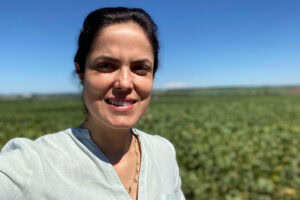The autonomous John Deere from a farmer’s perspective: Part II

What do farmers think of the autonomous John Deere? What impact will it have on their farm? Future Farming asks farmers around the world. This week: Cassio de Oliveira Kossatz and Monique Martins Lima Silveira from Brazil.
Fully autonomous tractors have inspired vivid dreams for many farmers in the past years. Now it seems to be becoming a tangible reality for thousands of farmers worldwide. John Deere has announced the 8R, the first autonomous tractor for large-scale production, during the CES event this January. Despite great interest in the 8R, Brazilian farmers still see the autonomous tractor more or less as a thing of the future. This future has come a lot closer, but for the Brazilian market it is not yet fully viable.

Cassio de Oliveira Kossatz grows 4,000 ha of grains in Ponta Grossa city, Paraná state, in Brazil. He is aware and excited about the launch of the autonomous John Deere. “I guess there are operations where the autonomous tractor could help us. Currently, it is increasingly difficult to find people who are willing to work on a farm”, he says.
Hurdles
Before autonomous technology makes its appearance on his farm, there are still some hurdles to overcome, says Cassio de Oliveira Kossatz. “I guess the automation process will progress step-by-step. I still think it’s too early to say – once the tractor is actually availabe here – if we will be ready to use it here in Brazil”, he adds.
Cassio anticipates autonomous tractors and machines will initially be useful in simpler operations, like soil preparation and transporting grains from harvesters to trucks.
Human experience still pivotal

Grower Monique Martins Lima Silveira in Rio Verde city, Goias state, says she would love to adopt autonomous machinery as the JD 8R. Replacing workers by robots maybe a good alternative, but she thinks human experience in the field is still pivotal. “Technology still struggles with simple issues such as lack of internet in rural areas and machines’ limitations to adapt to the reality in the field. So, I see it as a possibility, but I feel in practice a lot of infrastructural improvements are needed for autonomous machinery to be a viable solution in Brazil.”
In other words, the technologies and the companies that develop it, still have work to do to convince these farmers. A good way to do that is proving the technology performs and is reliable in practice.
Monique says she expects nothing less than “perfection” in all operations. “I would like to use it for seeding and fertiliser applications. In the future for pesticide applications as well, if sprayers are adapted. The autonomous technology should not only work perfectly, but should also be practical in use, agile, and save money.”
Return on investment
When it comes to investments costs, both Brazilian farmers say they understand an autonomous tractor requires a higher investment than a conventional tractor. However, both feel autonomous machinery should provide a reasonable return on investment.
When asked Monique says she woud be willing to to pay no more than 20% extra for an autonomous tractor in comparison to a conventional tractor. After all, adds Cassio, tractor operators assist in several tasks on farms, “not only inside the tractor”.
Will the John Deere 8R will be available to convince Monique and Cassio to invest in autonomous technology? That question will hopefully be answered next year; the John Deere 8R is expected to enter the Brazilian market in 2023.
Earlier, we talked to Saskatchewan farmer Kenton Possberg about the autonomous John Deere 8R. Read the article here.
Join 17,000+ subscribers
Subscribe to our newsletter to stay updated about all the need-to-know content in the agricultural sector, two times a week.



